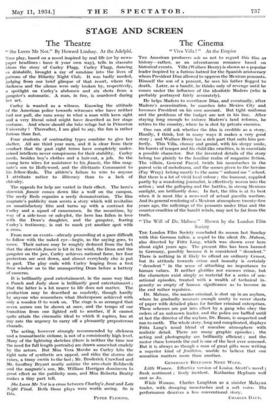The Cinema
" Viva Villa ! " At the Empire THE American producers ask us not to regard this film as history—rather, as an adventurous romance based on historical events. Villa (Wallace Beery) is shown as a popular leader inspired by a furious hatred for the Spanish aristocracy whom President Diaz allowed to oppress the Mexican peasants. Himself the son of a peasant, he sees his father flogged to death. Later, as a bandit, he thinks only of revenge until he comes under the influence of the idealistic Madero (who is probably portrayed fairly accurately).
He helps Madero to overthrow Diaz, and eventually, after Madero's assassination, he marches into Mexico City and becomes President on his own account. But tight uniforms and the problems of the budget are not in his line. After staying long enough to enforce Madero's land reforms, he retires to the country, where he is shot by private enemies.
One can still ask whether the film is credible as a story. Hardly, I think, but in many ways it makes a very good story ; and Wallace Beery has a rich part that suits him per- fectly. This Villa, clumsy and genial, with his sleepy smile, his bursts of temper and his child-like cruelties, is in essentials a possible character. But the invented details of the story belong too plainly to the familiar realm of magazine fiction. The villain, General Pascal, twirls his moustaches in the purest vein of melodrama, and the scenes given to the heroine (Fay Wray) belong mostly to the same " unhand me " school. But there is a lot of vivid local colour ; the humour, supplied partly by a wandering journalist, is effectively woven into the action ; and the galloping and the battles, in strong Mexican sunlight, are brilliantly done. In fact, the film is at its best when it is most like a news-reel of actual guerilla warfare. And its general rendering of a Mexican atmosphere twenty-five years ago, the sufferings of the peasants under Diaz and the counter-cruelties of the bandit rebels, may not be far from the truth.








































 Previous page
Previous page